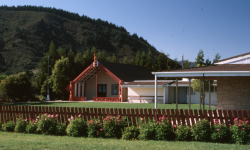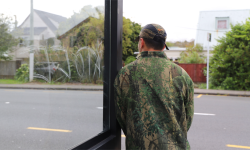
NZBMS General Director Alan Jamieson shares his thoughts on the context we, as a missional Baptist movement, may soon find ourselves in.
u201cHe moana pukepuke e ekengia e te wakau201d
u201cA choppy sea can be navigated by a wakau201d
This whakatauku012b speaks to our time. 2020 certainly saw choppy seas here in Aotearoa, but these seem like ripples in a bathtub compared to the full global impact of COVID-19 and the economic upheavals the rest of the world is experiencing. The poor, the refugees, those who are trafficked and those who have no voiceu2014their experience could be better described as a tsunami.
The pandemic, a crisis in its own right, has brought to light many other global crises. Dr Jay Matenga1, speaking to Mission Council in December, commented that the impacts of the pandemic are like petrol on the smouldering fires of change in global mission. Trends that were merely embers prior to 2020 are now fully aflame, leaving mission agencies and churches struggling to catch up.
We at NZBMS are no exceptionu2014weu2019re aware that we find ourselves part of a sudden and dramatic shift, needing to listen to Godu2019s quiet voice in the midst of a storm. But there is goodness to be found! As the Old Testament prophet Nahum recorded, u201cGodu2019s way is in the whirlwind and storm.u201d2
So which way do we go?
Jay quotes Nobel Memorial Prize winner, Milton Friedmanu2014u201cOnly a crisis produces real change. When that crisis occurs, the actions that are taken depend on the ideas that are lying around.u201d In other words, there are ideas, learnings, failures, past successes and crucial insights already on our waka that give us clues to navigate the new storms.
Psalm 107:23-24 (KJV) says,
They that go down to the sea in ships,
that do business in great waters;
these see the works of the Lord,
and His wonders in the deep.
At NZBMS, we are actively searching for the works of the Lord and seeking his wonders in the depths of the storm. Weu2019re reassessing our waka and the lessons learned over the years. And what are we seeing? Here are at least some clues:
NZBMS began in 1885 because of the Baptist churchesu2019 desire to send people called by God, to partner with him in his global mission. No church could do it on their own, so we joined together to achieve what we couldnu2019t alone.
Since then, we have been sending and supporting global workers in India and Bangladesh, especially those working with the West Bengal people. Over a century of continuous partnership means we have formed deep roots, developed trusting relationships and been involved in significant gospel transformation in the lives of local people.
We have made mistakes. Withdrawing from Mu0101ori mission in 1888 was a costly error. For more than 60 years we felt the repercussions of that and it was only last year that an official apology was extended to Mu0101ori leaders. There is much humility needed as we seek to re-engage with, and learn from, Mu0101ori. We too have made mistakes in our Freeset journey, ones we are seeking to learn from through an independent review that is currently underway.
As all global workers who have served for more than a decade will tell you, u201cI learnt more and grew more than I gave.u201d We, in humility, need to recognise that we have more to gain through engagement in global mission than we will ever give to those we learn from, especially in our personal faith and the health of our church lives. We know our journey is one of mutual transformation.
NZBMS is integrally linked to our Aotearoa Baptist churches and we need to share the same vision, heart and direction. Moving forward, we want to weave ourselves into the national Baptist vision as u2018a collective of faith communities bringing gospel renewal to people and places in our local neighbourhoodsu2019.
We must stay close to the scriptures that have guided the many generations that precede us. We personally find the four great calls of Jesus to be lighthouses from which we can navigate the worst of storms. His Great Commission (Matthew 28:16-20) that sets the worldwide scope of Godu2019s mission, his Great Commandment (Matthew 22:34-40) that sets our hearts to see and love our neighbour, his Great Compassion (Matthew 25:34-40) that sets how we are to love, and his Great Commitment (John 17:18-25) that sets out Godu2019s priority for deep relationship and unity. As Jay points out, the early church had a focus on doing life together, believing that this was the greatest witness of all.
We know the sea is rough and storms abound for so many right now, but there are always clues through which to navigate the waka. Jayu2019s final message to Mission Council was about resilience. Godu2019s mission is not completeu2014he is still calling and awakening hearts to the needs of the world. That means we, as an organisation, have a responsibility to stay the course. We will support those who God is calling, share our resources, and form relationships that show genuine partnership and mutual learning. As Jay would say, we will continue to u201c#stayonmission!u201d Join us.
Contributor: Alan Jamieson, NZBMS General Director
References:
- Jay is the executive director for the World Evangelical Alliance Mission Commission and leads Mission Interlink NZ. He is at the heart of global mission conversations and well-positioned to reflect on current trends.
- Nahum 1:3 (New International Version).


